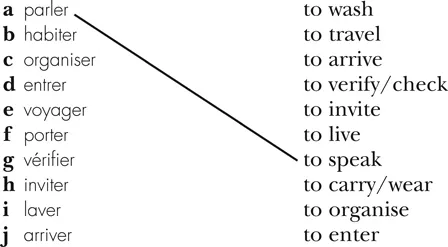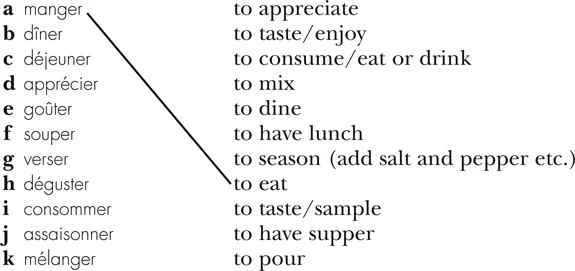
eBook - ePub
French Grammar Made Easy
Rosi McNab
This is a test
Share book
- 204 pages
- French
- ePUB (mobile friendly)
- Available on iOS & Android
eBook - ePub
French Grammar Made Easy
Rosi McNab
Book details
Book preview
Table of contents
Citations
About This Book
French Grammar Made Easy is the ideal introduction to the basics of French grammar for anyone new to the language or looking to refresh their knowledge.
The Grammar features:
-
- concise and jargon-free explanations supported by examples
-
- exercises throughout to reinforce learning
-
- a "fast-track" option for more advanced learners
-
- a full answer key, making the Grammar ideal for self-study.
French Grammar Made Easy presents the essential patterns and rules of the French language in a clear and accessible manner. It is the ideal Grammar for those wishing to supplement their learning and move beyond the phrasebook level.
Frequently asked questions
How do I cancel my subscription?
Can/how do I download books?
At the moment all of our mobile-responsive ePub books are available to download via the app. Most of our PDFs are also available to download and we're working on making the final remaining ones downloadable now. Learn more here.
What is the difference between the pricing plans?
Both plans give you full access to the library and all of Perlego’s features. The only differences are the price and subscription period: With the annual plan you’ll save around 30% compared to 12 months on the monthly plan.
What is Perlego?
We are an online textbook subscription service, where you can get access to an entire online library for less than the price of a single book per month. With over 1 million books across 1000+ topics, we’ve got you covered! Learn more here.
Do you support text-to-speech?
Look out for the read-aloud symbol on your next book to see if you can listen to it. The read-aloud tool reads text aloud for you, highlighting the text as it is being read. You can pause it, speed it up and slow it down. Learn more here.
Is French Grammar Made Easy an online PDF/ePUB?
Yes, you can access French Grammar Made Easy by Rosi McNab in PDF and/or ePUB format, as well as other popular books in Languages & Linguistics & French Language. We have over one million books available in our catalogue for you to explore.
Information
1
VERBS
1.1 Talking about doing things
Why verbs first? Because verbs are so important. They are the ‘glue’ that holds a language together. A noun is just the name of something or someone, it can be singular or plural, but a verb is used to tell [or ask] you something. In many languages verbs are ‘codified’ to tell you who or what is doing it or when it happens. In English we usually stick a lot of verbs together: He was running, I would like, Did you know? … but in French they usually add a different ending to the verb. Il courait, je voudrais, vous saviez?
►► If you know what a verb is, go on to 1.1.1.
You use a verb to talk about what someone or something does, is doing, has done or intends to do. A verb is often called a doing word.
To find out if a word is a verb, ask yourself if it is about doing something.
I Which of these words are things you can do?
- run
- jeans
- sleep
- make
- easy
- eat
- under
- blue
- think
- after
Some words can be used as verbs, nouns or adjectives, e.g. play can be a play at the theatre or part of the verb to play.
Ask: Are they ‘doing’ it? If they are, it is a verb.
II Which of the highlighted words are being used as verbs?
- Jason and Lily run a homework club in the church hall.
- They go for a run every morning.
- They both work at the local school.
- After work they go straight to the hall.
- Tonight they are having a meeting to discuss funding.
- They are meeting in the church hall.
- They need more chairs for the children.
- Jason usually chairs the meetings.
- Lily records the proceedings and types them up.
- The records show that they have met three times this year.
1.1.1 What is the infinitive?
►► If you know what the infinitive is, go on to 1.1.2.
When you look up a verb in a dictionary, you will find the infinitive. This is the ‘name’ of the verb.
In English, the infinitive consists of to + verb, e.g. to read, to buy, to travel.
III Here are some French infinitives. You probably know some of them already or can guess what they mean. See how many you can match up with their English counterparts.
Try to look for similarities between the French and the English. Some are obvious: for example, organiser means to organise. Others are less obvious, such as laver meaning to wash (a lavatory was the place where people used to wash) and porter meaning to carry (a porter was someone who carried something).

IV The verbs in III are usually referred to as ‘-er’ verbs (pronounced E.R.) because they end in -er. Here are some more -er verbs. How many of them do you know already? They all have to do with food and eating.

If you find it difficult to learn new words, try to find a ‘hook’ to hang them on: e.g. manger, a manger where you put the food for an animal. And if you have travelled in France, you will almost certainly have seen signs at places selling wine, saying Dégustation, which means they are inviting you to sample their wines.
More than 50% of English words derive from French words or have the same stem. If you don’t know a verb, try saying the English word with a French accent – you have a 50% chance of being understood!
New words made into verbs are usually -er verbs: e.g. faxer = to fax; surfer = to surf; monopoliser = to monopolise, etc.
V What do you think the French for these verbs would be? Cover up the French and see if you can work it out.
| a to decide... |